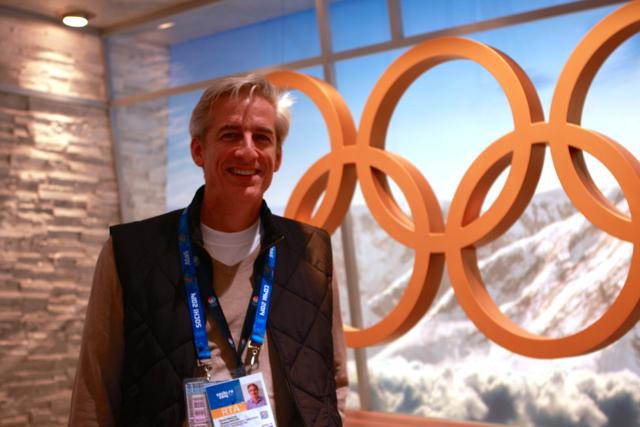BEIJING—As the 2022 Winter Games approach, NBC is busily preparing its tech facilities and staff to bring its most comprehensive coverage to American viewers starting Feb. 3.
In addition to all the challenges to go with being the second consecutive Olympics taking place during a global pandemic, there have also been issues with weather and accessibility to venues, according to Dave Mazza, senior vice president and CTO for NBC Sports Group and NBC Olympics. In addition, there’s also the unique challenge that comes from the quick turnaround between the Summer Games in Tokyo and the Winter Games.
NBC's coverage of the Tokyo Games was the first time the network broadcast the Games in 4K/HDR. As for Beijing, the network is expected to reveal its plans for 4K/HDR coverage in the days leading up to the two-week event.
(See also: NBC Preps For ‘One-Two Punch’ Of Winter Olympics, Super Bowl Coverage)
TV Tech recently spoke with Mazza on the network’s preparations.
TV Tech: Besides the quick turnaround from Tokyo to Beijing in just a matter of months, what were some of the other biggest challenges you face in covering the Winter Games in Beijing?Dave Mazza: The biggest challenge in the planning effort heading into the Winter Games for our production team has been working through all the COVID policies and protocols, including testing and travel.
Another challenge we’re facing is at the venues themselves. Although the Winter Games have roughly half the number of sports as the Summer Games, the winter sports are often in much more difficult places to access in terms of setting up our production, which makes efforts such as pre-cabling for something like downhill skiing trickier.
Dealing with the cold temperatures and ice at venues up in the mountains also poses a challenge. We’ve been utilizing generators to ensure our equipment runs properly and doesn’t freeze.

With NBC Sports also producing Super Bowl LVI in February, much of the usual Olympic staff is also devoting time to that effort, so we are producing two of the largest media events in the world at the same time.
TVT: How did you plan for the quick turnaround?DM: With only six months from the Tokyo Closing Ceremony to the Winter Games, we decided we were going to keep as much of the equipment and workflows the same from one event to the other. Of course, the sports change from the Summer to Winter, but we have tried to keep the quantity of feeds, the number of circuits, the number of Super Mos—all of the items that require hardware and configuring—similar.
TVT: What are the biggest differences between covering the Olympics in Beijing, compared to Tokyo?DM: A big difference has been the physical side of planning our production at the Winter venues. Due to COVID, we have not had a physical presence at certain venues in Beijing until recently, and so we hadn’t been able to actually be on-site and stand at the physical camera locations for much of the recent planning.
Like building a house, we have drawings for what the architects and planners think this is all going to look like, but when you get spread out enough on the extreme hill or the downhill or some of these venues that are pretty much out in nature, the AutoCAD’s that they drew aren’t necessarily showing you where all the trees are, for example.
And of course, before the snow is in place, you can’t predict what is going to happen.
TVT: How many hours of coverage will NBC provide over all of its platforms?DM: NBCUniversal will present a Winter Olympics-record 2,800+ hours of coverage across NBC, Peacock, USA Network, CNBC, NBCOlympics.com and the NBC Sports app when the XXIV Olympic Winter Games from Beijing, China, begin in February.
TVT: Are there any new technical advances that viewers will be able to see since Tokyo?DM: Working with OBS, the camera count has continued to go up, along with an increased amount of super motion systems, rail cams, and cable cams. As the technology grows, we are continuing to grow the use of POV cameras, unique angles, and incorporating angles from the athlete’s view of competition.
(See also: The TV Technology Behind the Beijing Winter Olympics)
For example, we’ve added Super Mos with long lenses at figure skating events to give us the ability to show detailed views of spins or close-up shots of the turn of a skater’s foot or a look at which edge of their skate they land on.
We are also enhancing graphics throughout event broadcasts with elements such as superimposing skiers on top of each other on screen for racer comparisons, using simulcam and “stromotion” options to give multiple views and enhance athlete movements, including the spins and height in figure skating jumps or skills in halfpipe and aerial events, and utilizing the most-ever multicamera replay systems with the capability to show various angles of an event in stop action.
TVT: What’s the number in terms of staffing that NBC will send to Beijing? / Are there any differences from Tokyo in terms of protecting staff against COVID?DM: Similar to Tokyo, the majority of our production will be based at our Stamford (Conn.) facility. A large portion of staff and facilities were moved home this year as a function of COVID protocols and ensuring the health and safety of our staff.
The venues that continue to have the biggest on-site presence in Beijing are the primetime venues, including Opening and Closing Ceremonies, figure skating, short track, alpine, and sliding events.
We recently announced that all announce teams will be based in Stamford, but several reporters will still be on site in Beijing. It was also announced that Mike Tirico will begin the Games in Beijing before flying to Los Angeles to host primetime from outside SoFi Stadium and then hosting Super Bowl pregame coverage.




